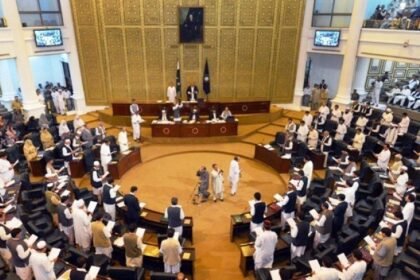Tokyo / Seoul / Taipei ( The COW News Digital)Asian stock markets witnessed significant losses on Friday morning following the announcement of sweeping new tariffs by former U.S. President Donald Trump. The move triggered a sharp reaction from investors, rattling confidence across key Asia-Pacific markets and sparking fears of heightened global trade tensions.
According to U.S. media reports, major indices in Japan, South Korea, and Taiwan fell into the red zone as traders responded to what analysts are calling a “tariff shock.” The unexpected and widespread implementation of tariffs by the United States has fueled concerns over a potential slowdown in global trade and economic activity.
Japan’s benchmark Nikkei 225 index dropped 0.6%, reflecting investor unease over export-dependent sectors. South Korea’s KOSPI index took the steepest dive, plunging 3.2%, marking one of its sharpest single-day declines in recent months. Taiwan’s TAIEX closed with a 0.4% loss.
Interestingly, Hong Kong’s Hang Seng index managed a modest gain of 0.2%, buoyed by local tech stocks and speculation of possible policy support from Beijing.
Market analysts attribute the downturn to investor reaction to the Trump administration’s new tariff regime, which includes increased tariffs on multiple Asian economies. While some countries such as Pakistan were given preferential rates, others — notably India, South Korea, and Taiwan — faced higher-than-expected levies, triggering fears of retaliatory trade measures and long-term uncertainty in the global supply chain.
“This is a classic example of a policy-driven sell-off,” said Kenji Saito, a Tokyo-based economist. “The tariff announcement not only unsettled trade partners but also introduced volatility in an already fragile global market recovering from inflation and post-pandemic shocks.”
Business communities across the region are now calling for diplomatic engagement to prevent further deterioration in trade relations. The latest developments are also expected to weigh on upcoming economic forecasts across Asia, with some experts predicting downward revisions in GDP growth if the trade environment remains unstable.
The coming days will be crucial as global markets react further and governments consider their responses. All eyes are now on how Asia’s central banks and trade ministries plan to navigate the economic turbulence sparked by Washington’s aggressive trade posture.







